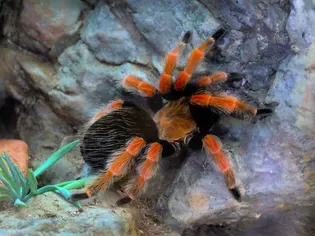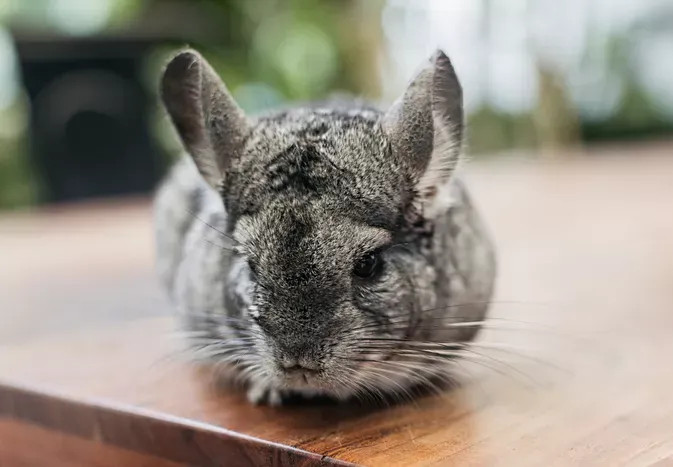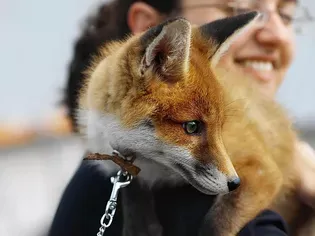Should You Keep a Genet as a Pet?
Updated on 05/26/24

Should You Keep a Genet as a Pet? Unleashing the Enchantments and Challenges
Introduction
Genets, enigmatic creatures of the viverrid family, have captivated human imagination for centuries. Their allure stems from their striking appearance, agile movements, and intriguing behaviors. However, before considering one as a pet, it's crucial to delve into the complexities and responsibilities associated with owning this exotic animal. Join us as we unravel the fascinating world of genets, exploring the pros and cons of keeping them as companions and providing invaluable insights to guide your decision.
Unveiling the Allure of Genets
1. Striking Appearance: Genets boast a captivating appearance that sets them apart from other domestic pets. Their slender bodies, adorned with distinctive spots, stripes, or rosettes, give them an air of wild elegance. Their piercing eyes, often yellow or green, convey intelligence and alertness.
2. Agile Grace: Genets are renowned for their exceptional agility and grace. Their long tails provide balance as they navigate treetops and traverse fences with ease. Their sharp claws, adapted for climbing, allow them to scale vertical surfaces with remarkable dexterity.
3. Captivating Behaviors: Genets exhibit a range of intriguing behaviors that endear them to potential owners. Their playful nature is often expressed through chasing toys, pouncing on unsuspecting objects, and engaging in acrobatic antics. Their territorial marking behavior, using scent glands, can also be intriguing to observe.
Understanding the Challenges
1. Exotic Pet Regulations: Genets are not domesticated animals, and their ownership is regulated by various laws and ordinances. Depending on your location, obtaining a permit or license may be necessary. It's essential to research local regulations thoroughly to ensure compliance.
2. Specialized Diet: Genets have specific dietary requirements that can be challenging to meet in a domestic setting. Their diet primarily consists of live prey, such as rodents, birds, and insects. Providing a balanced and nutritious diet requires careful planning and access to appropriate prey species.
3. Nocturnal Nature: Genets are nocturnal animals, meaning they are most active at night. This can disrupt the sleep patterns of owners and require adjustments to household routines. Providing ample nocturnal stimulation and creating a designated nighttime habitat are crucial.
4. Scent Marking: Genets have scent glands that they use to mark their territory. This behavior can be a nuisance in a household setting, leading to unpleasant odors and potential conflicts with other pets. Regular cleaning and odor management techniques are necessary to mitigate this issue.
Assessing Compatibility: Are You a Suitable Genet Owner?
1. Lifestyle Compatibility: Genets require significant attention, exercise, and mental stimulation. They are not suitable for owners with busy schedules or limited space. Providing a large enclosure, offering regular play sessions, and engaging in interactive activities are essential for their well-being.
2. Financial Responsibility: Owning a genet can be financially demanding. The costs associated with food, veterinary care, enclosure maintenance, and licensing can add up quickly. It's important to factor in these expenses before making a commitment.
3. Veterinary Expertise: Genets have specialized veterinary needs that require access to experienced professionals. Their unique health issues and exotic nature demand specialized knowledge and treatment options. Establishing a relationship with a knowledgeable veterinarian is crucial.
Alternatives to Pet Ownership
While owning a genet may not be feasible for everyone, there are alternative ways to appreciate these fascinating creatures:
1. Wildlife Observation: Visit wildlife sanctuaries or national parks where genets are known to reside. Observing them in their natural habitat provides a unique and educational experience.
2. Educational Encounters: Museums or zoos may offer educational programs that allow visitors to learn about genets and witness their behaviors up close under controlled conditions.
3. Photography and Art: Capture the beauty of genets through photography or artistic interpretations. Join wildlife photography workshops or visit exhibitions that showcase their captivating presence.
Conclusion
Genets are captivating animals with unique personalities and intriguing behaviors. While their allure is undeniable, the decision to keep one as a pet should be made with careful consideration. Understanding the challenges and responsibilities involved, assessing personal compatibility, and exploring alternative ways to appreciate genets are essential steps in making an informed choice. For those prepared to provide the necessary care and attention, a genet can bring immense joy and fascination into their lives. However, for those with limited resources, time, or lifestyle compatibility, alternative avenues offer equally rewarding experiences with these enchanting creatures.
Explore More Pets

Exotic Pet Species
Should You Keep a Chimpanzee as a Pet?

Exotic Pet Species
Should You Keep a Raccoon as a Pet?

Exotic Pet Species
How to Care for a Pet Mexican Red-Knee Tarantula

Exotic Pet Species
12 Best Exotic Pets for Apartment Living

Exotic Pet Species
Best Foxes to Keep as Pets

Exotic Pet Species
Should You Keep a Northern Flying Squirrel as a Pet?

Exotic Pet Species
Should You Keep Stick Insect as a Pet?

Exotic Pet Species
Should You Keep a Big Cat as a Pet?
